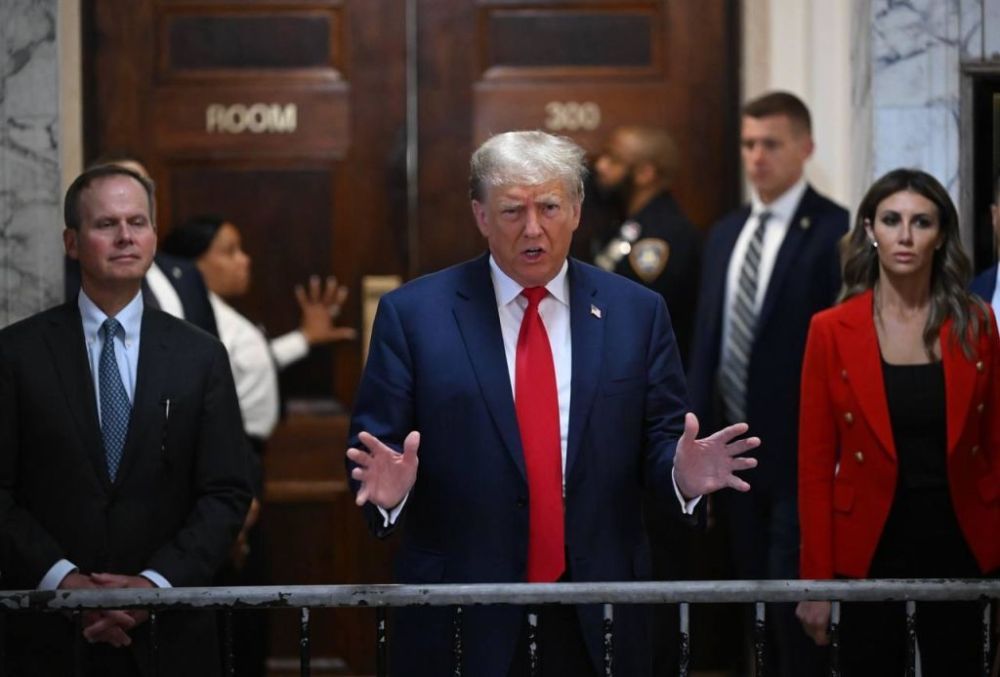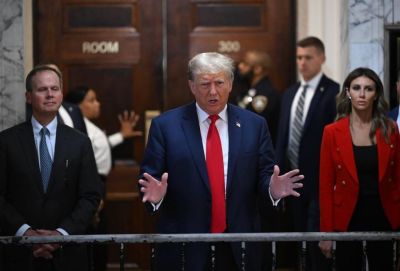Happy Collision day! Let’s get right into it.
The Docket
- Two of Donald Trump’s sons, Donald Trump Jr. and Eric Trump, testified this week in their father’s ongoing civil fraud trial in New York. Both claimed they were not involved in drafting their father’s financial statements—despite Don Jr.’s signature appearing on multiple statements of Trump’s financial condition. In its lawsuit against the Trump Organization, the New York Attorney General’s office has argued that Trump, his two older sons and his daughter Ivanka, and several other co-defendants worked together to inflate Trump’s wealth in order to secure better loan terms for the company.
- The former president is certainly testing the limits of his gag order in his D.C. election interference trial, which Judge Tanya Chutkan reinstated on Sunday after pausing it nine days earlier. “REMEMBER, CROOKED JOE BIDEN AND HIS RADICAL LEFT THUGS WAITED THREE YEARS TO BRING THESE INDICTMENTS & LAWSUITS AGAINST ME," Trump posted on Truth Social on Halloween. “RIGHT IN THE MIDDLE OF MY CAMPAIGN!” It was Trump’s reference last month to special counsel Jack Smith as a “thug” (among other epithets) that partially inspired Chutkan’s gag order, in which Trump is barred from “targeting” Smith, other federal prosecutors, court officials and staff, and witnesses. It’s hard to interpret Tuesday’s post as referring to anyone but Smith and his team, but Chutkan has not yet taken action with any additional fines.
- Hunter Biden published an op-ed in USA Today on Thursday going after Republicans for the “political weaponization” of his drug addiction. The son of President Joe Biden decried Republicans for what he labeled a “sustained disinformation campaign” against his father and an “all-out annihilation” of his reputation.
On Trump and the 14th Amendment Cases
Courts in Colorado and Minnesota are hearing arguments this week about whether Donald Trump should be barred from appearing on the ballot in those states because he is constitutionally disqualified from serving as president. The proponents of keeping Trump off the ballot are citing, of all things, the 14th Amendment, one of the three post-Civil War amendments to the Constitution and the focus of some of the most consequential constitutional litigation in American history.
Without writing our own law review article, let’s highlight some of the arguments underpinning this effort to use the courts to keep Trump out of the White House. The claim is that Section 3 of the 14th Amendment prohibits Trump from holding office because of his efforts to overturn the results of the 2020 election. So let’s start with that portion of the Constitution:
No person shall be a Senator or Representative in Congress, or elector of President and Vice President, or hold any office, civil or military, under the United States, or under any state, who, having previously taken an oath, as a member of Congress, or as an officer of the United States, or as a member of any state legislature, or as an executive or judicial officer of any state, to support the Constitution of the United States, shall have engaged in insurrection or rebellion against the same, or given aid or comfort to the enemies thereof. But Congress may by a vote of two-thirds of each House, remove such disability.
Off the bat, constitutional scholars have debated whether any of Trump’s actions after the 2020 election—the submission of false electors, for example—meet the definition of “insurrection or rebellion.” Was January 6 an “insurrection” or a riot? Are those who participated in it “enemies of the United States” or just regular old criminals? Did Trump give “aid or comfort” to those rioters with his public statements or initial refusal to quell the violence? And did he “engage in” the events of that day if he hasn’t been charged with incitement?
Because Trump never held state or federal office before serving as president, it’s also not clear this section applies to him at all. Per the 14th Amendment, someone is only disqualified from running for office if he or she had previously taken an oath to support the Constitution “as a member of Congress, or as an officer of the United States, or as a member of any state legislature, or as an executive or judicial officer of any state.” Notably absent from that list: the president and vice president.
It may seem obvious to conclude that those two roles are encapsulated by “officer of the United States,” but there are plenty of places in the Constitution where the president appears to be separate from “officers of the United States.” In Article II, for example, the Constitution says the president “shall Commission all the Officers of the United States.” But the president doesn’t commission himself, of course. Elsewhere, the Constitution says “the President, Vice President and all civil Officers of the United States, shall be removed from Office on Impeachment.” The section seems to identify the president and vice president as being distinct from “all civil Officers.”
There’s also the question of whether the text bars someone from becoming president when it disqualifies a person from becoming “a Senator or Representative in Congress, or elector of President and Vice President, or [to] hold any office, civil or military, under the United States, or under any state.” Would the drafters of the Amendment go to the trouble of specifying that members of the Electoral College and both houses of Congress are included, but only sweep the president and vice president under “officer … under the United States.” As the late Supreme Court Justice Antonin Scalia wrote two decades ago, “Congress does not hide elephants in mouseholes”—meaning that text should not be read to include big stuff in its vague terms or ancillary provisions.
That said, during the original debates over the Amendment in the 1860s, Sen. Reverdy Johnson of Maryland noted the text had omitted the president and the vice president—inadvertently, in his opinion—leading another senator to point him to the words “or hold any office, civil or military, under the United States” and claim they were, in fact, included in this catchall. Despite this confusion, however, there was no effort to clarify the Amendment’s language—in either direction.
None of these questions are particularly easy for the courts to answer. So what happens now?
The Minnesota Supreme Court heard arguments in the case on Thursday. However the body comes down, its decision can be appealed directly to the U.S. Supreme Court. The Supreme Court can then decide to stay the Minnesota Supreme Court’s decision, allowing Trump’s name to appear on Minnesota’s ballot while they consider the case, which could be done on an emergency basis or as part of the court’s normal calendar. If the latter, Trump wouldn’t have a resolution until after the March 5 primary in Minnesota. Oh, and the court could decline to hear the case at all, meaning Trump’s name just wouldn’t appear on the ballot for Minnesota’s primary.
The situation in Colorado is a little more complex, because any trial court decision would need to be appealed up through the state court system before it could reach the U.S. Supreme Court. So the more realistic question in that case is whether they allow Trump’s name to appear on the ballot for Colorado’s primary—also on March 5—while the decision is being appealed. There’s also a possibility the Supreme Court weighs in on that question: What status quo should be preserved while a case of this magnitude affecting a federal election makes its way through the state court system?
If the Supreme Court takes either case, it will have to decide how broadly to rule. Will the justices focus on the question of whether these states can refuse to put Trump’s name on the ballot? Or will they decide the underlying question: whether the 14th Amendment bars Trump from holding the office of the presidency?
In short, questions about Trump’s disqualification are barreling toward the Supreme Court at a breakneck pace. The court will be forced to decide whether a presidential candidate supported by tens of millions of people—and perhaps one for whom many millions have already cast their ballot—can be barred from holding office. Either way, the decision will land with an impact many orders of magnitude bigger than Bush v. Gore and perhaps larger than any decision in the country’s history.
One More Thing
Many people wading into this 14th Amendment discussion have predictably fallen into their partisan camps. But within legal circles on the right, things haven’t been quite so neat.
Conservative legal scholars like University of Chicago professor Will Baude and University of St. Thomas School of Law professor Michael Paulson have argued that Trump is disqualified under the 14th Amendment, while other conservatives like former Attorney General Michael Mukasey and South Texas College of Law Houston professor Josh Blackman have made the case that he is not. Steven Calabresi, a founder of the Federalist Society and a Northwestern Law School professor, initially said he believed Trump was disqualified, but has since changed his mind.
Whither Impeachment?
We focus chiefly on the intersection of politics and the courts here in The Collision, and we try to leave the goings-on on Capitol Hill to our able colleagues at Uphill and Dispatch Politics.
But from time to time, we’re going to check in on the House Republicans’ impeachment effort because of how closely tied that investigation is to both the active criminal investigation into Hunter Biden and to how Donald Trump’s own legal situation could be politically neutralized. In other words, if Republicans can successfully paint President Joe Biden as criminally corrupt, we could be looking at a general election that turns on a straightforward question: Which of the two major-party candidates do swing voters in battleground states believe is the bigger crook?
The ouster of House Speaker Kevin McCarthy and chaotic interregnum seems to have put impeachment on the back burner this fall. Following a September 28 hearing led by the inquiry’s leader, Rep. James Comer of Kentucky (who is also the chairman of the House Oversight Committee), has said he’s not interested in holding any additional hearings.
But this week, new House Speaker Mike Johnson has indicated he will continue to back the impeachment inquiry into the president started under his predecessor. In a Thursday press conference on Capitol Hill, however, he was noncommittal on when to expect articles of impeachment to actually be filed. “I do believe that very soon we are coming to a point of decision on it,” he told reporters.
But the outlines of the case against Biden are beginning to take shape, even if the evidence remains circumstantial. Johnson, Comer, and two others involved in the inquiry—Reps. Jim Jordan and Jason Smith—joined Fox News host Sean Hannity on Wednesday, claiming to have new information implicating the president in a scheme to financially benefit from his son’s foreign business arrangements. The revelation, which Comer had released earlier in the day, was a series of financial transactions between August and September 2018 that House Republicans say are related and indicate a scheme of foreign influence peddling and corruption.
“It traces directly back to China,” Comer told Hannity.
Comer’s tracing begins with a $5 million payment on August 8, 2017, from a Chinese energy company to a joint venture between a Chinese businessman and Hunter Biden. Over the next month, there were a series of financial transactions between entities controlled by Hunter and Joe Biden’s brother and sister-in law, James and Sara Biden, which ended with Sara writing a $40,000 check to Joe on September 3, 2017. The memo line on the check reads “loan repayment,” just like a separate $200,000 check from James to Joe in 2018 that Comer’s committee obtained and released last month.
What Comer has insinuated, but not proven, is Joe Biden’s knowledge of—or involvement in—a scheme to attract the Chinese investment. Comer points to a July 2017 text message allegedly sent by Hunter Biden to his Chinese partner saying that he is “sitting here with my father” and wondering why an apparently agreed-upon investment commitment had not been fulfilled. The $5 million payment came just days later, but Hunter’s claim in the text message remains the only evidence that Joe Biden knew anything of the business arrangement.
There are plenty of unanswered questions and unproven claims raised by the investigation, including the central claim from House Republicans that Joe Biden corruptly used his position as a former vice president to benefit financially. Even Comer admits, for instance, that it’s “certainly plausible” the purported loan repayments to Joe Biden are exactly that. And the failure by Comer and the Oversight Committee Republicans in their first hearing of the impeachment inquiry to produce any witnesses with direct evidence of wrongdoing suggests there’s more work to be done before the GOP had Biden dead to rights. As Rep. Ken Buck, a Republican who has expressed skepticism of the impeachment evidence, drily told The Dispatch on Thursday, the investigation is “ongoing”—no matter how much Republicans claim they’re closing in.
The leaps in logic from Comer may explain why House leadership is being cagey about whether impeachment articles are coming. A failed impeachment trial without clearer proof of Biden’s corruption could end up backfiring on the GOP.
But as we examined a few weeks ago, more voters than ever before—40 percent in the most recent Fox News poll—say they think Biden did something illegal. The benefit to Republicans may come from presenting enough evidence to muddy the issue of presidential wrongdoing.








Please note that we at The Dispatch hold ourselves, our work, and our commenters to a higher standard than other places on the internet. We welcome comments that foster genuine debate or discussion—including comments critical of us or our work—but responses that include ad hominem attacks on fellow Dispatch members or are intended to stoke fear and anger may be moderated.
With your membership, you only have the ability to comment on The Morning Dispatch articles. Consider upgrading to join the conversation everywhere.